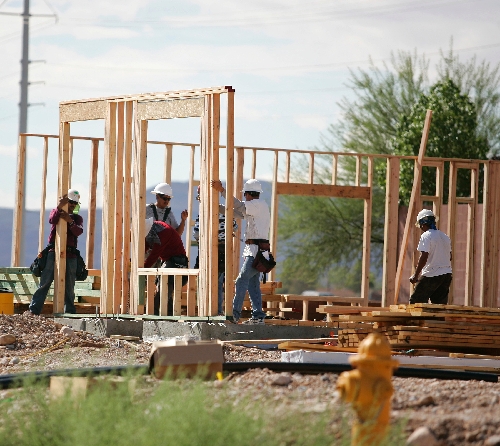Analyst: Las Vegas home values need four, five years of ‘rebooting’

The Las Vegas housing market has shown significant signs of recovery this year, but it’s still going to take four to five years to work through impending foreclosures and the “rebooting” of home values, housing analyst Dennis Smith said Friday.
Net sales per subdivision have been running at 0.7 a week for the past five weeks, which is a healthy rate and in line with what most analysts like to see, the president of Home Builders Research said at Las Vegas Housing Outlook at Springs Preserve.
Traffic through models at new-home subdivisions has increased 2 percent this year, and is down in every submarket except the east and southwest. The southwest has been the most active submarket with 1,881 net sales in 2012 and traffic count of 42,830, up from 1,065 sales and 38,153 traffic in 2011, Smith reported.
After slumping to a low of 3,732 in 2011, new-home building permits have steadily grown and should finish the year around 5,750, the analyst calculated. They’ll climb to 6,000 next year and 6,500 in 2014, he said.
New-home prices have been bouncing around $200,000, falling below that level to $199,743 in September, while the resale median is $129,500.
Interest rates are as low as they’ve been in 40 years, but people still can’t get qualified for a loan because banks are requiring credit scores of 750, Smith said.
“So demand is strong. We would be selling more houses if we had everything in place, but I don’t think we can,” he said. “There are too many other factors.”
Near-term factors that will affect the housing market include Assembly Bill 284 and the national mortgage settlement, uncertainty over the so-called “shadow inventory” and underwater mortgages, the need to move from investor sales to owner-occupants, stock market stability and job growth.
New-home sales are limited by finished lot inventory, which has dwindled to 13,500 from 19,000 at the beginning of the year, Smith said. Aliante in North Las Vegas has only 33 lots available.
“I read where a homebuilder bought 50 lots. Back in the day, we talked about 200, maybe 500 lots. Now it’s a big deal when you see 50 lots,” he said.
Raw land prices are about $150,000 to $230,000 an acre, depending on location and infrastructure, and finished lots are going to require added costs, Smith said.
“If you can find a finished lot under $50,000, good luck. It’s probably in an area you don’t want to be. Most builders are paying $75,000 in the hot submarkets,” he said.
Much of the housing market’s improvement is due to a shrinking inventory of real estate-owned homes, or foreclosures, available for sale in Las Vegas.
“Whatever you want to believe, whether it’s (AB) 284 or the national mortgage settlement, I don’t know, but it is what it is and I get tired of hearing about it,” Smith said.
During a panel discussion, many of the questions from the audience focused on the number of homes being held by the banks and the potential of those homes being dumped on the market.
Rick Shelton, owner and broker at Better Homes and Garden Realty, cited a report from the Mortgage Bankers Association showing 89,000 housing units in Las Vegas that are at least 30 days delinquent. CoreLogic puts the 30-day delinquency at 20,000 and 90-day delinquency at 55,000.
It’s taken five years to process 225,000 foreclosures in Las Vegas, and with the slowing of the foreclosure process, it’ll probably take four or five years to go through the next 100,000, he said.
Ken LoBene, director of the U.S. Housing and Urban Development office in Las Vegas, said 65 percent of FHA loans are nonperforming, or delinquent, in Las Vegas. It should be 8 percent to 13 percent in a normal market.
“We have a much bigger footprint than we normally would. That’s unsustainable,” LoBene said. “We lose about 77 cents on the dollar on every foreclosure. It’s even less on nonperforming note sales. The real problem is how to reduce the footprint. It could become draconian.”
The problem with strategic defaults – borrowers who can afford to pay their mortgage but have decided to stop – is going to worsen, said Venicia Considine, attorney with Legal Aid Center of Southern Nevada.
“I have more people calling me saying they’re the last owner on the block, they paid $300,000 for their home, everyone else is a renter. That’s the shadow inventory we’re worried about,” Considine said. “They have the ability to pay and stay in the house, but they’re finding too much frustration.”
Banks that can’t get rid of homes they own have created a number of “strategic squatters” in Las Vegas, said Michele Johnson, president of Financial Guidance Center.
Contact reporter Hubble Smith at hsmith@reviewjournal.com or 702-383-0491.